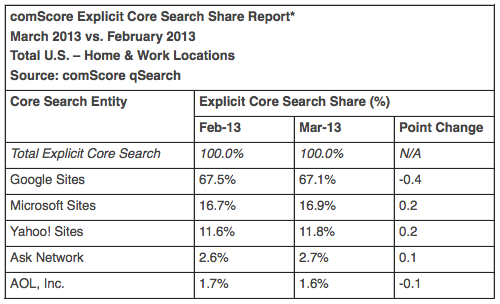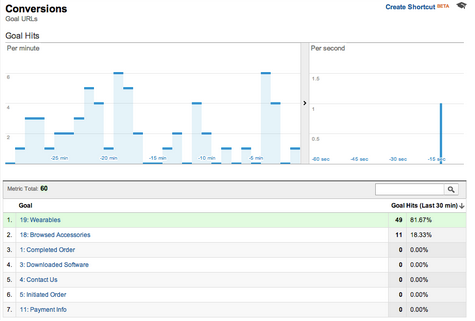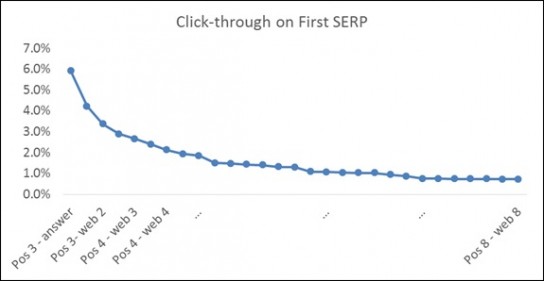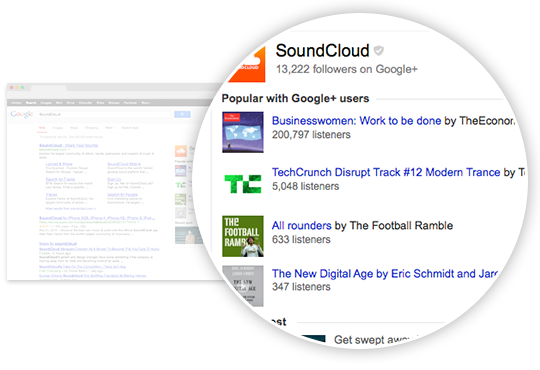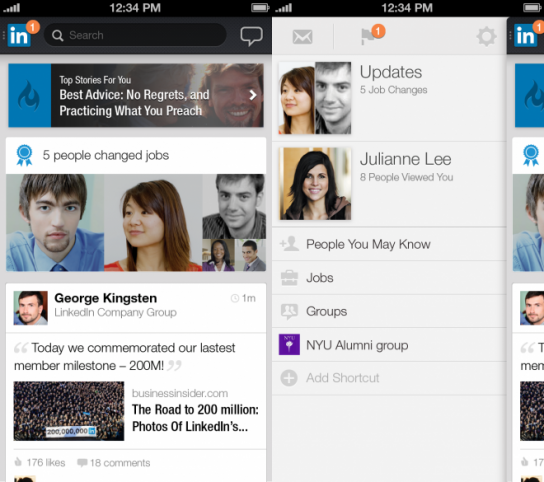Internet Marketing News April Recap
May 6, 2013May is here which means warm weather, vacation time, and the April Internet Marketing News wrap up! Before we jump into April, be sure to catch up on the top March updates including new search filters on Google and Bing, discontinued Yahoo Apps, redesigned Facebook and YouTube, and new Twitter targeting functionality. Desktop search activity also hit an all-time high at over 20 billion searches according to ComScore. What does this mean for the individual search engines? Google dropped slightly (67.5% to 67.1%) while both Bing and Yahoo grew slightly at 0.2% each.
And with that, we close out March and move onto April’s top Internet marketing news stories.
- Google Now, a predictive search tool originally only available on Android phones, is rolling out to more users. There have been reports of people noticing it on the Google homepage, similar to the old iGoogle. Google has confirmed that Google Now will be on iPad and iPhone with the new Google search app on iOS.
- Google kicked off April by launching a new keyword bulk upload feature in AdWords which allows users to edit and remove keywords at scale. In addition, the company introduced the upgrade center for the new enhanced campaigns which will enable the same functionality of bulk uploads the enhanced campaigns rolling out this summer. Lastly, AdWords announced screen sharing functionality with an AdWords rep utilizing Google+ Hangout technology.
- On the user experience side, Google pulled the related searches filter, as well as Instant previews, citing low usage. It has also announced the trial of a new quick view badge for mobile which enables users to see the page immediately without having to load the website. Currently, it seems that Google is only testing it on Wikipedia pages.
- Google Analytics managers can now see real-time goal conversion reports. Check out the screenshot below.
Bing
- Kicking off April, Bing redesigned its search advertising resource hub for ad managers. This new site provides a single access point for all content and resources around Bing and Yahoo advertising.
- Bing ads saw some updates as well, including new site links and ad position reporting. Advertisers can now view an Ad Extension Details report showing site link performance data by campaign as well as a “Top vs. Other” column showing ad performance in the mainline or sidebar. Bing also announced new in-line search term reporting coming to Bing Ads as well as product ads coming this summer.
- Furthering Bing’s dedication to incorporating social search, Bing added “Pin It” buttons on its image search. While there is no proof that more pins will improve an image’s rank, this does ensure an easier user experience for pinning images to Pinterest.
- According to Dr. Ronny Kohavi of Bing’s Research and Development team, more than 50% of searchers click on the first SERP result and this number drops drastically to 4-6% on the third result. Below is a trend graph for page 1. Bing has used this data to manipulate the number of listings on page 1, which now range from 4-14 results depending on the query.
Yahoo!
- Yahoo! stayed relatively quiet in April but did make some major updates to a couple of its apps, including Yahoo mail for iPad and Android, as well as an improved weather app for the iPhone. The new weather app integrates user generated images from Flickr with local and international forecasts.
- Brands can now target ads for Facebook users based on activity outside of Facebook.com, utilizing partner data such as Acxiom, Datalogix, and Epsilon. Facebook is trying to gain more pull with large advertisers as it pieces together actionable data such as shopping patterns, email lists, and loyalty programs on its users.
- Facebook continued to make improvements to its local application. One change is rebranding Facebook Nearby to Facebook Local Search. Another update pushed a revised design for brand pages in hopes users use Facebook as a local search engine.
- A highly anticipated move, Facebook releases Facebook Home, a move closer to a Facebook phone. Currently only available on Android, Facebook Home is a user interface that integrates Facebook deeply into all phones functions. It surpassed half a million downloads in nine days; however, users seem to be highly dissatisfied with it giving it a 2.5 out of five stars on Google Play. Here is a first look at Facebook Home:
- After much hype, Twitter launches “Twitter #Music,” a new music discovery app that uses your Twitter activity including tweets and engagements to detect music that you’ll most likely enjoy. The app also uses Rdio and Spotify to enable users to listen live to their new discoveries.
- The Twitter hackings continued into April. The twitter accounts for 60 minutes, 48 hours and one CBS affiliate TV station were hacked by pro-Syrian government hackers. In addition, the AP twitter account was hacked tweeting “Breaking: Two Explosions in the White House and Barack Obama is injured.” While the account was suspended almost instantly, and the White House released a brief announcing the tweet was fake, the Dow Jones dropped drastically. Twitter is now working on implementing a two-step verification security protocol which the company will be rolling out after completing internal tests.
- In an effort to increase its paid search revenue, Twitter announced new keyword based targeting advertising options which enables a more effective targeting of promoted tweets to users with relevant posts.
Google+
- Google continues to encourage users to utilize their Google+ log in across all its platforms. Google upgraded its Google Places dashboard with Google+ integration, another step in transferring Google Places into Google+ Local. Google also released an iPhone app for managing these listings, but removed it immediately citing that the release was inadvertent and the app will be live when they complete it.
- Google also announced the end of the Meebo bar, almost a year after acquiring it for about $100 million in hopes that users will switch to Google+ and its single sign on. The Meebo bar will be retired on June 6.
- App developers using the Google+ sign in, which was announced in February, are seeing an increased visibility in SERPs as Google integrates postings directly into SERPs.
YouTube
- Shortly after announcing that YouTube is now getting more than one billion unique visitors every month, Robert Kyncl, Vice President, Global Head of Content Partnerships for YouTube, announced that these visitors “are watching more than 6 billion hours of video each month on YouTube; almost an hour a month for every person on Earth and 50 percent more this year than last.”
- YouTube and Google+ are integrating deeper as now you can manage your YouTube account and channels with Google+ pages. This will allow multiple Google+ accounts to manage a YouTube account as well as unlock improved video sharing, live broadcasts via hangouts, and a YouTube tab on your Google+ page.
- LinkedIn revamped its mobile app focusing more on content such as stories and updates. This redesign bought more mobile traffic to the app, which now accounts for 27% of unique visitors. LinkedIn is also testing Facebook style people and company mentions in updates and comments to further foster user engagement.
What’s new at Catalyst
- Clayburn Griffin, Organic Search Director, wrote an article for the Raven Tools blog titled, How to measure and report social SEO metrics.
- Ben Spiegel, Director of Organic Search, published part two on “Optimizing Videos for YouTube Search” that was featured on ClickZ. Ben also wrote an article for Startup nation on Twitter’s New, Bigger Stage for Small Businesses.
- For more frequent updates on Catalyst news, industry events, and featured articles check out our new company news page.
- Sign Up for the Catalyst Must-Have Digital Insights e-Newsletter for the latest thought leadership, industry updates, and Catalyst news.
- Catalyst is Hiring! We have open positions in each of our offices, check out our Career Page for the latest open positions.
Have any questions about any of the above stories or think we missed something? Let us know in the comment section below. Also, be sure to check back in June for the next monthly recap!

